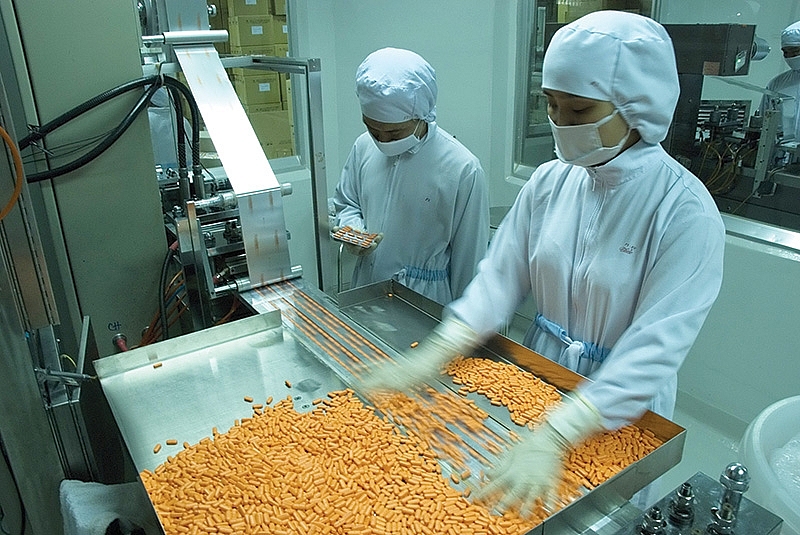Pharma firms look to future
 |
| New trade agreements are forcing pharmaceutical businesses to invest more in order to remain competitive, Photo: Duc Thanh |
After facing a difficult year in 2018 due to increased competition within the sector, CVI Cosmetic & Pharmaceutical Co., JSC (CVI), a relatively-young player in the pharmaceutical industry, is investing more in technology. It is also developing its marketing process, as well as its business and sales governance in preparation for the upcoming opening of its new high-tech factory in Hanoi’s Hoa Lac Hi-Tech Park in late 2019.
“In 2019, we will invest heavily in new and advanced medical technology for the new factory. Instead of concentrating on functional products which have a low market protection, we will venture further into others with a higher market protection such as traditional medicines. We aim to increase traditional medicines to 30 per cent of our total products in 2019 and then to 50 per cent beyond,” Phan Van Hieu, chairman of CVI, told VIR.
Thus far, CVI has signed a co-operation agreement with the Korea Testing & Research Institute which will enable it to export products to 100 countries worldwide.
Along with young players in the sector, giant drug producers such as Domesco, Vietnam’s third-largest listed drug maker, Hau Giang Pharmaceutical JSC (DHG), the country’s biggest publicly-traded drug maker, and Imexpharm, the country’s fourth-largest drug maker, are making similar moves. They are giving priority to innovations in technology as well as research and development to stand firm amid new challenges emerging from the enforcement of the Comprehensive and Progressive Agreement for Trans-Pacific Partnership (CPTPP).
According to a reliable source, Imexpharm, whose 48.96 per cent stake is owned by foreign stakeholders, is going to put into operation its Vinh Loc hi-tech antibiotic plant in Ho Chi Minh City, costing VND180 billion ($7.82 million) in late 2019. This will go along with the hi-tech Binh Duong pharmaceutical plant, which is set to cost VND370 billion ($16.8 million), in early 2020. Both meet the standards set out by EU-GMP certification.
“With our new facilities, we aim to increase revenue from prescription drugs (ETC) to make up 40 per cent of our total revenue in the future. We also aim to get 50 per cent from over-the-counter, non-prescription drugs, and the remaining 10 per cent from exports,” said a source from Imexpharm.
Similarly for Traphaco (TRA), the country’s second-largest publicly-traded drug maker, its annual investment in research and innovation activities make up 3 per cent of the company’s revenues from production.
“For our sustainable development strategy between 2017 and 2020, we aim to develop our production technology to be among the most advanced in the nation and on par with global standards. We have equipped our new western factory with the latest modern technology,” said a TRA leader.
At present, State Capital Investment Corporation, Magbi Fund Ltd, and Super Delta Pte., Ltd, are TRA’s biggest shareholders with stakes of 35.67, 24.99, and 15.12 per cent, respectively.
Industry insiders said that the move is a way for drug makers to venture further into the profitable segment of ETC which is currently dominated by multinational corporations.
Due to growing competition, 2018 was a challenging year for domestic pharmaceutical companies. The difficult year saw a number of giant drug markers fail to meet their business targets. TRA reached consolidated revenues of VND1.8 trillion ($78.3 million), meeting just 75 per cent of its yearly target, and a 4 per cent drop on-year. Moreover, the company also saw consolidated after-tax profits of VND157 billion ($6.83 million), fulfilling just 51 per cent of its yearly target, and equal to just over 65 per cent of 2017’s figure.
This uninspiring outlook was also seen at DHG, a company which has Japan’s Taisho Pharmaceutical Holdings as a major shareholder with a 32 per cent stake. The company made consolidated net revenues of VND3.88 trillion ($168.7 million), down 4.43 per cent on-year.
What the stars mean:
★ Poor ★ ★ Promising ★★★ Good ★★★★ Very good ★★★★★ Exceptional
 Tag:
Tag:
Themes: CPTPP
Related Contents
Latest News
More News
- Ho Chi Minh City launches plan for innovation and digital transformation (February 25, 2026 | 09:00)
- Vietnam sets ambitious dairy growth targets (February 24, 2026 | 18:00)
- Masan Consumer names new deputy CEO to drive foods and beverages growth (February 23, 2026 | 20:52)
- Myriad risks ahead, but ones Vietnam can confront (February 20, 2026 | 15:02)
- Vietnam making the leap into AI and semiconductors (February 20, 2026 | 09:37)
- Funding must be activated for semiconductor success (February 20, 2026 | 09:20)
- Resilience as new benchmark for smarter infrastructure (February 19, 2026 | 20:35)
- A golden time to shine within ASEAN (February 19, 2026 | 20:22)
- Vietnam’s pivotal year for advancing sustainability (February 19, 2026 | 08:44)
- Strengthening the core role of industry and trade (February 19, 2026 | 08:35)






















 Mobile Version
Mobile Version